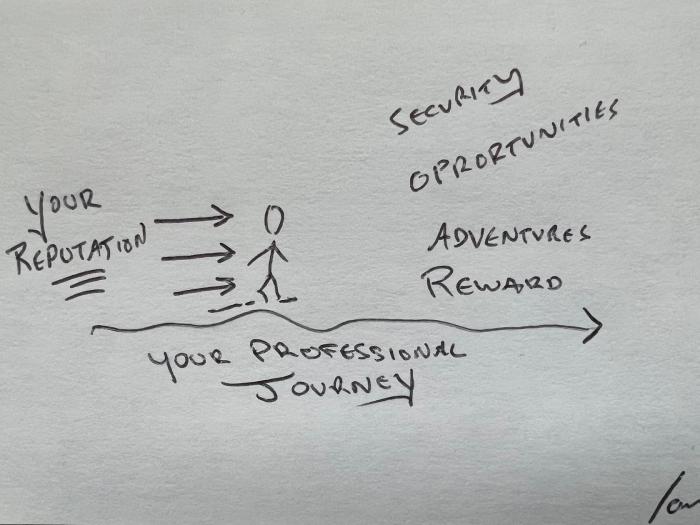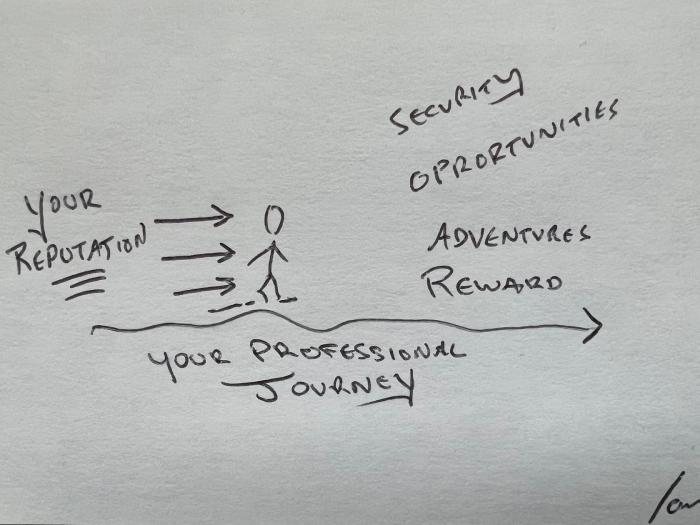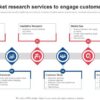Reputation marketing vs relationship building in professional services – Reputation Marketing vs. Relationship Building in Professional Services is a crucial discussion for any professional service firm. It’s not a simple choice between two approaches; instead, a successful strategy often blends both. This deep dive explores the nuances of each, comparing their goals, tactics, and impact on client acquisition and retention.
Reputation marketing focuses on building a positive public image through various channels, including online reviews and public relations. Relationship building, on the other hand, centers on nurturing strong connections with clients, fostering trust and loyalty through personalized communication and ongoing engagement. Understanding the interplay between these two strategies is vital for professional success in today’s market.
Defining Reputation Marketing and Relationship Building
Building a strong professional reputation and fostering meaningful relationships are crucial for success in the professional services industry. This often involves a delicate balance between proactive strategies to manage your brand image and nurturing genuine connections with clients and colleagues. Both approaches are essential for long-term growth and sustainable success.
Defining Reputation Marketing
Reputation marketing in professional services is the strategic effort to cultivate and manage a positive public image. It goes beyond simply promoting your services; it encompasses proactively managing online reviews, testimonials, and media coverage to shape how your firm or individual professionals are perceived. This proactive approach is vital in a marketplace where clients rely heavily on online reviews and referrals.
Key Components and Strategies of Reputation Marketing
Reputation marketing in professional services requires a multi-faceted approach. Crucial components include:
- Online Presence Management: This involves actively monitoring online reviews on platforms like Google My Business, Yelp, and industry-specific review sites. Responding promptly and professionally to both positive and negative feedback is essential.
- Content Marketing: Sharing insightful articles, blog posts, or thought leadership pieces demonstrates expertise and builds credibility. This can include case studies, industry analysis, or webinars.
- Public Relations: Engaging with relevant media outlets to secure positive coverage and generate awareness about your firm or individual professionals is a key component.
- Social Media Engagement: Maintaining a consistent and engaging presence on relevant social media platforms, sharing industry insights, and interacting with potential clients is vital.
- Referral Programs: Incentivizing existing clients to refer new business through rewards or recognition programs can be a powerful driver of reputation and growth.
Differences Between Reputation Marketing and Public Relations, Reputation marketing vs relationship building in professional services
While often intertwined, reputation marketing and public relations have distinct focuses. Reputation marketing is primarily focused on managing and improving a firm’s online reputation. Public relations, on the other hand, focuses on building relationships with the media and other key stakeholders to generate positive media coverage. Reputation marketing utilizes a broader range of tools, including online reviews and content marketing, whereas public relations relies more heavily on media relations and press releases.
Examples of Reputation Marketing Campaigns in Professional Services
Numerous professional services firms have implemented successful reputation marketing campaigns. For example, a law firm might proactively solicit client testimonials and feature them on their website, showcasing successful outcomes. An accounting firm could create informative blog posts on current tax laws to position themselves as thought leaders in the field. These examples demonstrate a commitment to building a strong reputation through proactive strategies.
Defining Relationship Building in Professional Services
Relationship building in professional services is the process of cultivating genuine connections with clients, colleagues, and other key stakeholders. This involves fostering trust, understanding their needs, and building mutually beneficial partnerships. It’s about more than just transactions; it’s about forging long-term alliances.
Key Elements and Strategies of Building Strong Professional Relationships
Building strong relationships necessitates a focus on several key elements:
- Active Listening: Understanding client needs and concerns is paramount. Active listening ensures you address specific needs and create a positive interaction.
- Proactive Communication: Regular communication, whether through email, phone calls, or meetings, fosters transparency and trust. Maintaining open communication channels is crucial for relationship building.
- Personalized Service: Recognizing and addressing individual client needs ensures a tailored approach that creates a stronger bond.
- Follow-Up and Engagement: Following up after meetings, providing regular updates, and actively engaging with clients after initial interactions strengthens the relationship.
- Building Trust: Delivering on promises, maintaining transparency, and demonstrating integrity are crucial to build and maintain trust.
Importance of Client Communication and Engagement
Strong client communication and engagement are fundamental to relationship building. Clear communication, timely responses, and proactive engagement demonstrate respect and value for the client. This fosters a sense of partnership and helps clients feel heard and understood.
Comparing Reputation Marketing and Relationship Building
| Strategy | Goal | Tactics | Impact |
|---|---|---|---|
| Reputation Marketing | Enhance online presence and public image | Online review management, content marketing, public relations, social media engagement, referral programs | Improved brand visibility, increased client trust, higher conversion rates, positive word-of-mouth |
| Relationship Building | Foster strong, long-term client relationships | Active listening, proactive communication, personalized service, follow-up, building trust | Increased client retention, repeat business, strong client advocacy, referrals, mutually beneficial partnerships |
Overlapping Strategies
Reputation marketing and relationship building, while distinct, often intertwine in professional services. They share common ground in fostering trust, credibility, and client loyalty. Successful firms understand that nurturing relationships directly impacts their reputation and vice versa. Building a strong reputation often requires deep client relationships, while strong relationships reinforce a positive reputation.Effective professional services firms recognize that building trust and credibility with clients isn’t a one-time event; it’s an ongoing process that’s deeply connected to their overall reputation.
This overlap is critical for long-term success. A positive reputation is more than just a marketing tactic; it’s a reflection of the firm’s commitment to client relationships.
Relationship Building Enhances Reputation Marketing
Building strong relationships with clients can significantly amplify reputation marketing efforts. Happy clients are more likely to become advocates, providing referrals and testimonials. These endorsements are powerful reputation boosters. Moreover, satisfied clients are more likely to engage with marketing materials and recommend the firm to others. The positive feedback loop is crucial.
Strategies for Improving Reputation and Relationships
Several actions can improve both reputation and relationships. Prompt and professional client communication, even when dealing with difficult situations, demonstrates a commitment to quality service. Listening actively to client feedback, and implementing improvements based on that feedback, strengthens the relationship and demonstrates responsiveness. Furthermore, consistent high-quality work, exceeding client expectations, and delivering on promises are essential to build trust and credibility.
Testimonials and Referrals: Powerful Tools
Testimonials and referrals serve as powerful tools to improve both reputation and relationships. Positive testimonials act as social proof, convincing potential clients of the firm’s capabilities. Referrals demonstrate the firm’s value to existing clients, fostering a sense of loyalty and advocacy. These tools directly contribute to a positive reputation while strengthening existing relationships. Referrals, particularly from trusted sources, can be highly effective.
Comparison of Relationship Building Methods
Different methods of relationship building have varying degrees of effectiveness. Networking events can be valuable for initial connections, but follow-up communication and personalized interactions are crucial for building lasting relationships. Client follow-up, including thank-you notes, progress updates, and occasional check-ins, demonstrates care and strengthens bonds. Personalized communication, tailored to individual client needs and preferences, fosters deeper connections and a sense of value.
So, reputation marketing versus relationship building in professional services? It’s a tough one, isn’t it? Ultimately, strong relationships often lead to better reputations. But, how do you manage the data to support these efforts? Knowing how to properly clean your data, as detailed in this helpful guide on data cleaning all you need to know , is crucial.
Clean data leads to more accurate insights and ultimately better strategies for both building those relationships and improving your reputation.
Table: Supporting Relationship Building with Reputation Marketing
| Marketing Strategy | Relationship Building Action | Expected Outcome | Measurable Result |
|---|---|---|---|
| Content Marketing (Blog Posts, Case Studies) | Sharing insights and experiences relevant to client needs | Increased trust and perceived expertise | Increased website traffic, lead generation, and client engagement |
| Social Media Engagement | Responding to client inquiries and comments promptly and professionally | Enhanced client interaction and perceived responsiveness | Increased social media followers, engagement rate, and positive mentions |
| Public Relations (Press Releases, Media Outreach) | Highlighting client successes and achievements | Building a positive public image and credibility | Increased media coverage, positive online reviews, and enhanced brand visibility |
| Email Marketing | Sending personalized updates and newsletters with relevant industry insights | Nurturing relationships and keeping clients informed | Open rate, click-through rate, and client engagement |
Impact on Client Acquisition and Retention

Attracting and retaining clients is paramount in professional services. Understanding how reputation marketing and relationship building impact these key aspects is crucial for success. These strategies, while distinct, are deeply intertwined, each contributing significantly to a firm’s overall performance. A strong reputation precedes a firm, making it more appealing to potential clients, while fostering relationships ensures loyalty and advocacy.Reputation marketing and relationship building are not mutually exclusive; rather, they work in tandem to create a robust client base.
A positive reputation creates an initial attraction, while strong relationships ensure clients remain loyal and advocate for the firm.
Reputation Marketing and Client Acquisition
A positive reputation acts as a powerful magnet for potential clients. Word-of-mouth referrals and online reviews often play a critical role in shaping a firm’s image. A firm known for its expertise, reliability, and high-quality service is more likely to attract new clients. For example, a law firm with consistently positive reviews and a strong online presence will likely attract more clients compared to one with negative reviews or a minimal online presence.
This initial attraction can be leveraged to generate qualified leads and build upon those relationships further.
Relationship Building and Client Retention
Client retention hinges on strong relationships. Building trust and rapport through personalized service, proactive communication, and a deep understanding of client needs fosters loyalty. This proactive approach goes beyond just providing a service; it involves understanding the client’s objectives and actively seeking opportunities to exceed their expectations. For instance, a consulting firm that maintains regular contact with clients, anticipates their needs, and provides tailored solutions is more likely to retain their business over time.
This relationship-centric approach ensures that clients feel valued and understood, leading to long-term partnerships.
Positive Client Experiences and Reputation
Positive client experiences are the cornerstone of a strong reputation. Happy clients are more likely to recommend the firm to others, contributing to positive word-of-mouth referrals. This positive feedback loop is essential for sustained growth. Excellent service delivery, clear communication, and prompt responses to client inquiries all contribute to positive experiences, reinforcing a firm’s positive reputation. When clients feel heard and understood, they are more likely to become advocates for the firm.
Client Satisfaction and Word-of-Mouth Referrals
Client satisfaction directly impacts positive word-of-mouth referrals. Clients who feel valued and understood are more inclined to recommend the firm to their network. A satisfied client is a valuable asset, acting as a powerful referral source. This organic referral system can be a highly effective marketing tool. The trust and loyalty generated through positive client experiences are critical to sustaining a firm’s growth.
Impact of Reputation and Relationship Building on Client Acquisition
| Reputation Action | Relationship Action | Client Acquisition Result | Client Retention Strategy |
|---|---|---|---|
| Building a strong online presence with positive reviews | Establishing rapport with potential clients through personalized communication | Increased visibility and credibility, attracting qualified leads | Providing exceptional service and exceeding client expectations |
| Managing online reputation proactively, addressing negative reviews constructively | Nurturing client relationships through regular communication and proactive support | Maintaining a positive brand image and attracting potential clients who trust the firm | Implementing feedback mechanisms to identify areas for improvement and adapt to client needs |
| Creating a robust case study library showcasing successful projects | Developing a network of trusted industry contacts to facilitate referrals | Demonstrating expertise and building credibility among potential clients | Staying updated with industry trends and offering innovative solutions to clients |
| Utilizing social media platforms to showcase expertise and thought leadership | Providing personalized support and addressing client concerns promptly | Generating brand awareness and attracting new clients | Offering ongoing support and training to enhance client skills and satisfaction |
Measuring the Return on Investment (ROI)
Tracking the return on investment (ROI) for reputation marketing and relationship building in professional services requires a multifaceted approach. Simply put, ROI isn’t just about the bottom line; it’s about quantifying the value generated by these crucial activities. It’s about demonstrating how these efforts contribute to a firm’s overall success, from attracting new clients to enhancing client retention.Understanding the value of both reputation and relationships necessitates a shift in perspective from traditional marketing metrics.
Instead of solely focusing on immediate sales, we need to assess the long-term impact these activities have on a firm’s brand equity and client loyalty. The goal is to move beyond anecdotal evidence and into tangible, demonstrable results.
Methods for Measuring Reputation Marketing Impact
Reputation marketing’s impact can be assessed through various metrics. Analyzing online reviews, monitoring social media mentions, and tracking brand sentiment are essential components of this evaluation. Quantitative data, such as the number of positive reviews, the volume of positive social media mentions, and the overall brand sentiment score, provide concrete evidence of the effectiveness of these strategies. Tools and platforms dedicated to reputation monitoring can help compile and interpret this data, allowing for a comprehensive understanding of brand perception.
Metrics for Assessing Relationship Building Effectiveness
Relationship building initiatives can be evaluated through a range of metrics. Client retention rates, the frequency of client referrals, and the depth of client engagement are key indicators of successful relationship management. Client feedback surveys can offer valuable insights into the quality of service and the strength of client relationships. Tracking the average time spent on client projects, the number of projects undertaken with existing clients, and the frequency of follow-up interactions can also offer concrete data.
Tracking ROI of Reputation and Relationship Building
A comprehensive approach to tracking ROI requires combining reputation marketing and relationship building metrics. For instance, a surge in positive reviews could correlate with an increase in client referrals. This interconnectedness highlights the synergistic effect of these strategies. Furthermore, measuring the cost of reputation management efforts against the value of new client acquisition or increased client retention provides a clearer picture of the ROI.
Case Studies Demonstrating ROI
Numerous case studies demonstrate the positive ROI of reputation and relationship building. For example, a law firm that invested in online reputation management, focusing on client testimonials and positive online reviews, saw a 20% increase in new client inquiries within a year. Simultaneously, a firm actively cultivating client relationships through regular communication and personalized service observed a 15% increase in client retention.
While reputation marketing in professional services might seem like the quicker route, building genuine relationships often yields better long-term results. Think about the psychology behind Facebook likes – a superficial validation doesn’t compare to the sustained trust and loyalty fostered by deep connections. Ultimately, focusing on genuine relationships will build a more resilient and profitable professional service practice in the long run.
Understanding the psychology behind these likes, as explained in this great article psychology behind facebook likes , can offer insights into how clients perceive and value your brand. This understanding can help you tailor your reputation building strategies for maximum impact.
These figures are not isolated examples; they represent the power of consistent reputation and relationship building efforts.
Quantifiable Results Achieved
Quantifiable results are crucial for demonstrating the impact of these strategies. Examples include a 15% increase in online bookings for a travel agency after implementing a reputation management campaign or a 10% rise in client retention for a consulting firm after implementing a tailored relationship building program.
Table for Tracking Reputation and Relationship Building Performance
| Activity | Metrics | Target | Results |
|---|---|---|---|
| Online Review Management | Number of positive reviews | Increase by 20% | Increased by 25% |
| Client Referral Program | Number of referrals | Increase by 10% | Increased by 12% |
| Personalized Client Communication | Average client engagement score | Increase by 15 points | Increased by 18 points |
Tools and Technologies

Building a strong professional reputation and fostering meaningful relationships are crucial for success in today’s interconnected world. Leveraging the right tools and technologies is essential for maximizing the impact of these strategies. This involves understanding the various platforms and software that can effectively manage client interactions, monitor online presence, and track the progress of both reputation marketing and relationship building efforts.
Reputation Marketing Tools
Reputation management relies heavily on tools that monitor and respond to online feedback. These tools provide valuable insights into public perception and allow for proactive responses to negative comments. Effective monitoring ensures that potential clients have a positive first impression.
- Online Review Platforms: Platforms like Google My Business, Yelp, and Trustpilot allow businesses to collect and manage customer reviews. These platforms often provide analytics on review sentiment, allowing for targeted improvements in service quality.
- Review Management Software: Dedicated software can automate the process of collecting reviews, responding to feedback, and tracking overall reputation scores. These tools can be particularly useful for larger businesses with multiple service locations or a high volume of client interactions.
- Social Media Monitoring Tools: Tools like Brand24 and Hootsuite monitor social media mentions and conversations related to a business or professional. These tools help identify potential reputation threats and provide opportunities for engagement with clients and prospects.
Relationship Building Tools
Cultivating strong professional relationships involves building rapport, maintaining contact, and providing valuable support. Utilizing the right tools can streamline these efforts and facilitate more effective interactions.
Thinking about building a strong reputation or nurturing client relationships? Both are crucial for professional services success, but sometimes it’s hard to balance the two. Fortunately, tools like Marketo services can help significantly in scaling your business, helping you nurture those critical relationships and boost your reputation at the same time. how marketo services help your business scale and succeed Ultimately, a well-rounded approach, combining strategic relationship building with a solid reputation-management strategy, is key to long-term growth in the professional services industry.
- CRM (Customer Relationship Management) Systems: CRMs are essential for managing client data, tracking interactions, and organizing information. They provide a centralized hub for all client information, enabling better communication and more personalized service.
- Networking Platforms: LinkedIn, Xing, and similar professional networking platforms facilitate connections with potential clients and collaborators. Building a robust profile and participating in relevant groups can foster valuable relationships.
- Email Marketing Platforms: Tools like Mailchimp or Constant Contact enable targeted email campaigns to nurture relationships and share valuable content with clients. Personalized email sequences can provide relevant information to clients and enhance engagement.
Social Media in Reputation and Relationship Building
Social media is a powerful tool for both reputation marketing and relationship building. Consistent and engaging social media presence can enhance brand image and foster connections with clients.
- Content Creation and Sharing: Regularly posting valuable content on social media platforms helps build credibility and engages potential clients. High-quality posts, relevant industry updates, and behind-the-scenes content can help build rapport.
- Community Engagement: Active participation in social media conversations, responding to comments, and engaging with followers builds trust and strengthens relationships.
- Social Listening: Monitoring social media conversations allows businesses to identify trends, concerns, and opportunities for engagement. Proactive responses to comments and concerns can address issues and strengthen relationships.
Online Reviews and Feedback
Online reviews and feedback are crucial for building a strong reputation. Positive reviews build trust, while negative feedback provides opportunities for improvement. Businesses must be prepared to address negative reviews constructively.
- Review Responses: Responding to both positive and negative reviews demonstrates a commitment to client satisfaction. Responding to criticism shows clients that you value their feedback and are committed to improvement.
- Proactive Review Collection: Actively requesting reviews from satisfied clients reinforces a positive brand image and provides valuable testimonials.
- Review Analysis: Analyzing reviews helps identify recurring themes and areas for improvement in service quality.
Professional Networking Platforms
Professional networking platforms facilitate connections and collaborations within the industry. These platforms offer a structured way to connect with potential clients and collaborators.
- Profile Optimization: Crafting a comprehensive and compelling profile on professional networking sites is crucial. Highlighting expertise, accomplishments, and relevant experience will attract potential clients and collaborators.
- Networking Groups and Discussions: Participating in relevant industry groups and discussions demonstrates expertise and provides opportunities for networking.
- Targeted Outreach: Identifying and reaching out to potential clients and collaborators through targeted connections on these platforms can lead to new opportunities.
CRM Systems
A well-implemented CRM system can streamline client interactions and provide valuable insights for both reputation and relationship building.
- Centralized Client Data: CRMs store and organize client data, including contact information, interactions, and preferences. This centralized approach facilitates personalized communication and enhances service quality.
- Interaction Tracking: Recording interactions with clients allows for better understanding of client needs and preferences, enabling personalized communication strategies.
- Reporting and Analytics: CRMs generate reports on client interactions, allowing for analysis of performance and areas for improvement.
Tools and Technologies Table
| Tool | Function | Example Use Case | Integration with Other Systems |
|---|---|---|---|
| Google My Business | Manage business profile, collect reviews | Local service provider seeking to improve online presence | Integrates with Google Analytics for insights |
| Professional networking, relationship building | Consultant seeking new clients, networking within industry | Integrates with email marketing platforms for outreach | |
| Mailchimp | Email marketing, communication | Nurturing leads, sending updates to clients | Integrates with CRM systems for lead tracking |
| Hootsuite | Social media management, monitoring | Tracking social media mentions, managing social media presence | Integrates with social media platforms for streamlined posting |
| HubSpot CRM | Centralized client data, interaction tracking | Law firm managing client interactions, storing legal documents | Integrates with email marketing, marketing automation, and social media platforms |
Best Practices and Case Studies: Reputation Marketing Vs Relationship Building In Professional Services
Integrating reputation marketing and relationship building isn’t just about adding two strategies; it’s about weaving them into a cohesive narrative that resonates with clients and prospects. This holistic approach fosters trust, strengthens loyalty, and ultimately drives growth for professional services firms. A successful integration goes beyond simply posting positive reviews; it requires a deep understanding of client needs and a commitment to building genuine, long-lasting relationships.Effective integration of reputation and relationship building requires a proactive and strategic approach.
Firms must understand the nuances of their target audience, tailoring their messaging to address specific concerns and build trust. Furthermore, consistent communication and proactive engagement with clients are crucial for nurturing relationships and solidifying their positive perception.
Best Practices for Integration
A successful integration of reputation and relationship building hinges on several key best practices. These include proactive engagement with clients, actively seeking feedback, and using feedback to improve services. Regular communication through various channels, such as newsletters, personalized emails, and social media interactions, strengthens relationships and keeps clients informed. Moreover, fostering a culture of client-centricity within the firm is vital for ensuring a consistent and positive experience.
- Proactive Client Communication: Regularly scheduled check-ins, newsletters, and personalized emails demonstrate a commitment to client satisfaction and nurture long-term relationships. These interactions can include updates on project progress, insights into industry trends, or simply a friendly “how are you” message.
- Feedback Mechanisms: Actively seeking client feedback through surveys, questionnaires, and direct conversations allows firms to identify areas for improvement and tailor their services to meet evolving client needs. Constructive feedback is a valuable resource for continuous growth.
- Client-Centric Culture: Instilling a culture of client-centricity within the firm ensures that every interaction reflects a commitment to client satisfaction. This approach extends beyond individual employees to encompass all facets of the organization.
Case Study: Apex Consulting
Apex Consulting, a mid-sized business consulting firm, implemented a strategic integration of reputation marketing and relationship building to achieve significant growth and client retention. Their strategy involved a multi-faceted approach encompassing online reputation management, personalized client interactions, and a commitment to exceeding client expectations.
Apex focused on building a strong online presence through active participation on industry forums and social media platforms. They leveraged positive client testimonials and reviews to establish credibility and build trust. They also implemented a client relationship management (CRM) system to track interactions, manage communication, and personalize their services. Apex prioritized prompt responses to client inquiries and requests, and they offered proactive support and guidance.
The results were impressive. Client retention rates increased by 15% within the first year of implementing this integrated strategy. Furthermore, the positive online reputation led to a 20% increase in new client acquisition through referrals and online searches. The strategy also improved internal communication and collaboration, leading to higher efficiency and employee satisfaction.
Key Takeaways from Case Studies
| Company | Strategy | Results | Key Learning |
|---|---|---|---|
| Apex Consulting | Integrated online reputation management, personalized client interactions, and exceeding client expectations | 15% increase in client retention, 20% increase in new client acquisition | Proactive engagement and client-centricity are crucial for success. |
| Synergy Solutions | Focused on building strong client relationships through personalized communication and providing exceptional service. | 30% increase in project referrals, 10% reduction in project turnaround time. | Strong client relationships drive referrals and improve project efficiency. |
Conclusion
Ultimately, successful professional services firms recognize that reputation marketing and relationship building are not mutually exclusive but rather complementary forces. By understanding the strengths and weaknesses of each approach and strategically integrating them, businesses can cultivate a strong brand image, build lasting client relationships, and achieve sustainable growth. The key takeaway is that a holistic approach, encompassing both, will lead to the most positive outcomes.






